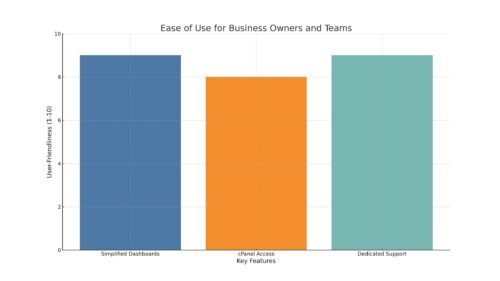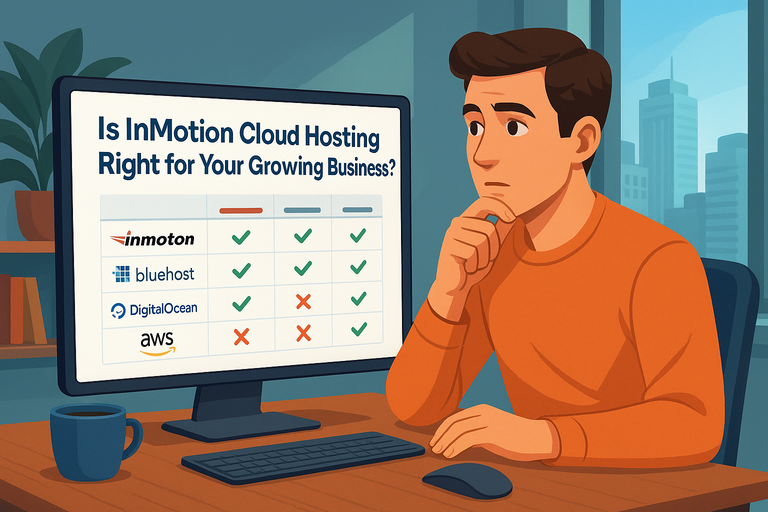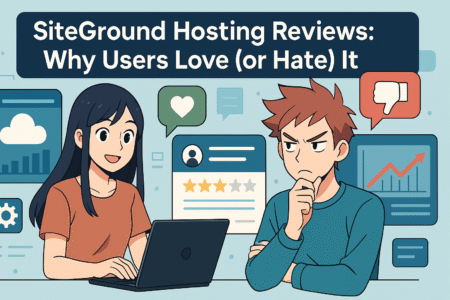Table of Contents
InMotion Cloud Hosting is often praised for flexibility, speed, and scalability, but is it the right choice for your growing business? As your company expands, choosing the right hosting platform can make or break your online performance.
This article breaks down what makes InMotion Cloud Hosting stand out, what challenges it solves, and whether it truly matches the needs of a business looking to scale online.
What Makes InMotion Cloud Hosting Different?
InMotion Cloud Hosting stands apart because it’s not just about storing files on a server — it’s about giving your business the room, speed, and reliability it needs to grow without roadblocks.
Let me break down the main reasons it feels different from a traditional hosting setup.
Flexible Hosting Built To Scale With Growth
I’ve seen plenty of businesses start out on shared hosting, only to outgrow it fast. That’s where InMotion Cloud Hosting feels like a breath of fresh air. Instead of being locked into rigid plans, you get the freedom to scale resources when you need them.
For example, imagine you launch a new product and traffic suddenly spikes. With cloud hosting, you can adjust RAM, CPU, or storage on demand instead of waiting for an upgrade or risking downtime. That flexibility means your website performance grows right alongside your business.
Here’s how this flexibility plays out in practice:
- You’re not tied to one physical server, so your site draws from a pool of resources.
- Scaling up happens through the dashboard in just a few clicks — no need to migrate.
- Growth doesn’t require a technical overhaul, which keeps you focused on business, not server headaches.
In my experience, this kind of adaptability is priceless for small to mid-sized businesses that don’t want to keep moving platforms every year.
Performance Benefits Backed By SSD And Resource Allocation
Speed is more than a nice-to-have; it’s the lifeline of your online presence. InMotion Cloud Hosting uses SSD (solid-state drives), which are far faster than old-school spinning hard drives.
The difference isn’t just theoretical. Pages load in seconds instead of sluggish waits, and that keeps both customers and search engines happy.
Another performance factor is resource allocation. Unlike shared hosting, where noisy neighbors can slow you down, cloud hosting gives you isolated resources. That means your RAM and CPU aren’t fighting with someone else’s blog traffic surge.
If you’re running an online store, this isolation can be the difference between processing hundreds of orders smoothly or losing sales to downtime during a flash sale.
I believe this alone makes InMotion’s setup worth considering if growth is your main focus.
Managed Services That Simplify Technical Challenges
Not every business has an IT team on standby. That’s where managed services come in handy. InMotion provides a layer of management that handles server updates, patches, and even proactive monitoring.
What I like here is the peace of mind. You don’t need to worry about running manual security updates or troubleshooting server issues at midnight. If something breaks, their team is there to help, and that’s part of what you’re paying for.
Think of it like this: Instead of buying just the car (the hosting server), you’re also getting a mechanic who tunes it, fills the gas, and checks the oil.
For many businesses, that kind of support is what allows them to focus on marketing, sales, or customer service rather than chasing down technical glitches.
How InMotion Cloud Hosting Supports Business Scalability

When your business starts growing, hosting becomes more than just a technical detail. It’s the backbone of how smoothly your website handles growth.
Here’s how InMotion Cloud Hosting makes scaling less of a headache and more of a natural step forward.
On-Demand Resources That Grow With Your Traffic
The best part of cloud hosting is elasticity. With InMotion, you can scale resources up or down depending on demand. Need more memory during the holidays when online orders spike? Add it. Traffic drops after the season? Scale back and save.
From the control panel, this scaling process is straightforward. You don’t have to migrate to a bigger plan or deal with downtime. Instead, it’s like adjusting a dial to match your traffic flow.
Here’s a quick scenario:
- You run a marketing campaign that triples site visitors overnight.
- Traditional shared hosting would crash under the weight.
- InMotion lets you add CPU power instantly, keeping your site fast and stable.
I advise thinking of it as future-proofing. You may not need those extra resources today, but when the moment comes, you’ll be glad the option is there.
Multi-Layered Redundancy For Reliability And Uptime
Downtime costs money — not just in lost sales but in trust. InMotion tackles this with redundancy, which is basically having backups of backups. Instead of your website living on one fragile server, your data is mirrored across multiple systems.
What this means in plain English: If one part fails, another kicks in automatically. Your visitors never notice the hiccup. This multi-layered safety net is what gives InMotion its strong uptime performance, something that’s critical for businesses with global customers logging in at all hours.
In my experience, the difference between a host with proper redundancy and one without shows up the first time a server fails. With InMotion, you’re far less likely to wake up to panicked emails about a site outage.
Tools Designed To Handle Sudden Traffic Surges
Every business dreams of going viral, but not every server can handle it. InMotion includes tools specifically designed to balance loads and absorb those unpredictable surges.
Load balancing is a simple but powerful concept: Traffic gets distributed evenly across servers so no single machine gets overwhelmed. Pair that with scalable resources, and you’re ready for sudden growth moments.
For example, say you’re featured in a major publication and suddenly thousands of people hit your site at once. With load balancing, the influx doesn’t take your site offline. Instead, it’s spread intelligently across the infrastructure.
That reliability gives you confidence to invest in bold marketing campaigns or product launches without worrying your hosting will collapse under pressure.
I recommend testing these features during a planned promotion so you know exactly how your setup reacts when things heat up.
Key Features Businesses Rely On With InMotion Cloud Hosting
InMotion Cloud Hosting isn’t just about servers and uptime numbers. The real value comes from features that actually help businesses run smoother and scale faster. Let’s look at the ones that matter most in everyday use.
Isolated Cloud Resources For Consistent Performance
One of the standout benefits here is resource isolation. In plain language, it means your site isn’t competing with other websites for CPU, memory, or bandwidth.
If you’ve ever been on shared hosting where your neighbor’s traffic spike slowed your site to a crawl, you’ll know why this matters.
With InMotion Cloud Hosting:
- Your allocated CPU and RAM are yours alone.
- Traffic surges on another account don’t impact your performance.
- You get more consistent speed, which is critical for SEO and user experience.
For example, if you’re running a small e-commerce store during a Black Friday promotion, you don’t want checkout times to lag because another site on the server suddenly went viral. Isolated resources make sure your customers see a fast, reliable store, no matter what’s happening elsewhere.
I believe this feature is especially useful for businesses where uptime equals revenue — SaaS apps, online retailers, or even high-traffic blogs.
Security Protections That Safeguard Business Data
Security isn’t something you want to leave on the back burner. InMotion provides layers of built-in protection that keep your data, customer information, and site safe from attacks.
Here’s what’s included:
- Free SSL certificates to encrypt customer transactions.
- DDoS protection that prevents overload from malicious traffic.
- Advanced firewalls and real-time malware scanning.
Let me put it into perspective: If you’re collecting customer emails or processing payments, you need these protections. A single breach can damage trust and cost far more than hosting ever will.
I recommend enabling automated backups too. InMotion gives you easy recovery options right from the control panel. That means if something goes wrong — a plugin breaks your site, or worse, a hacker gets in — you can roll back quickly without a panic attack.
Developer-Friendly Tools And Customization Options
Not every business has a developer on staff, but if you do, they’ll appreciate InMotion’s flexibility. The platform supports multiple languages (PHP, Python, Ruby, Node.js) and allows root access for those who need full control.
You can also stage new features safely before going live. From the dashboard, just spin up a staging environment, test your changes, and then push to production once you’re confident. That’s a lifesaver if you’re rolling out big updates and don’t want to risk breaking your live site.
In my experience, this is one of the hidden gems of InMotion Cloud Hosting — it manages to keep things simple for non-technical users, but still open enough for developers who want full customization.
Cost Considerations For Small And Mid-Sized Businesses
Hosting costs can be confusing, and no one likes surprise bills. InMotion Cloud Hosting makes a strong case for businesses that want predictable pricing with clear value.
Transparent Pricing Models That Avoid Hidden Costs
I’ve worked with hosting providers where the base price looks attractive, but then you get hit with add-ons for backups, SSL, or basic support. With InMotion, most essentials are already included. That transparency makes budgeting much easier.
For example:
- SSL certificates are free, so you don’t need to pay extra for security.
- Automated backups are built in at many plan levels.
- The advertised price is closer to what you’ll actually pay month to month.
This is refreshing compared to competitors who lure you in cheap but double the price when renewal hits.
I advise checking the fine print carefully, but in my experience, InMotion is one of the more upfront hosts when it comes to cost.
Comparing Costs Of Cloud Hosting Vs. Shared Hosting
It’s true that cloud hosting costs more than shared hosting. But the question is: what are you actually getting for that difference?
Here’s a quick comparison:
| Feature | Shared Hosting | InMotion Cloud Hosting |
| Performance | Shared across users | Dedicated resources |
| Uptime | Less reliable | High uptime redundancy |
| Security | Basic | Advanced protections |
| Scalability | Limited | Flexible scaling |
| Average Price (mo.) | $5–10 | $20–60 |
If you’re just running a small personal site, shared hosting works. But if your business depends on fast load times, uptime, and scaling, that extra investment in cloud hosting pays for itself.
Understanding The ROI For Growing Companies
Think about ROI (return on investment) not just as dollars spent but dollars saved and earned. Faster websites lead to higher conversions. Better uptime reduces lost sales. Stronger security prevents costly breaches.
For instance, if you’re running an online store making $5,000 a month, a 1-second page speed improvement could increase conversions by 7–10%. That’s $350–$500 extra revenue per month — easily offsetting the higher hosting cost.
I believe this is where InMotion shines. It may not be the cheapest option, but for a business that’s scaling, the long-term return outweighs the upfront expense.
Ease Of Use For Business Owners And Teams

Hosting shouldn’t feel like rocket science. InMotion has worked hard to balance power with usability, so both non-technical owners and tech-savvy staff can get what they need without frustration.
Simplified Dashboards For Non-Technical Users
The first thing I noticed in the InMotion dashboard is how clean and organized it feels. You don’t need to be an IT expert to find your way around.
From the main dashboard you can:
- Check resource usage at a glance (CPU, RAM, storage).
- Scale resources up or down with a couple of clicks.
- Manage domains, SSL certificates, and backups without digging into code.
For busy owners who just want things to “work,” this simplicity saves hours. You can focus on running your business instead of navigating a labyrinth of settings.
Access To cPanel And Familiar Management Tools
If you’ve used hosting before, chances are you’ve worked with cPanel. InMotion includes it, which means no steep learning curve. You can manage email accounts, install apps, or tweak databases with the same interface you already know.
Here’s a practical tip: From cPanel, you can use the Softaculous installer to launch WordPress, Joomla, or other apps in under 5 minutes. No manual file transfers, no database setup — just a few clicks and you’re up and running.
I suggest taking advantage of this if you’re migrating an existing site. It cuts down setup time and makes the transition smoother.
Dedicated Support That Scales With Your Needs
This is one area where I think InMotion deserves real credit. Their support isn’t just basic live chat — you can get help from specialists who actually understand cloud hosting.
As your business grows, you’ll likely hit questions that go beyond “How do I reset my password?” InMotion offers 24/7 U.S.-based support, plus optional managed hosting services if you want them to handle more of the heavy lifting.
In my experience, the difference here isn’t just speed of response but quality. Instead of copy-paste answers, you get actionable guidance tailored to your setup. That’s huge when you’re dealing with mission-critical issues.
How InMotion Cloud Hosting Handles Security And Compliance
Security is one of those things you only notice when it’s missing. InMotion Cloud Hosting builds in multiple layers of protection so you don’t have to constantly worry about threats, downtime, or compliance headaches.
DDoS Protection And Advanced Firewalls
A DDoS attack (Distributed Denial of Service) is basically when bad actors flood your site with traffic until it crashes. It’s more common than most people think, and it can take a business offline in minutes.
InMotion shields you with:
- Smart DDoS protection that blocks harmful traffic before it reaches your server.
- Advanced firewalls that filter suspicious activity.
- Real-time monitoring that spots issues before they snowball.
Think of it like having bouncers at the door of your business. Genuine customers walk in without a problem, but troublemakers get stopped before they ever set foot inside. I’ve seen this protection save businesses from losing days of revenue and credibility.
Automated Backups For Peace Of Mind
One of the things I always tell clients is this: “Your website is only as safe as your latest backup.” Mistakes happen. A plugin update breaks your store. An employee deletes the wrong database. Without backups, you’re stuck.
InMotion automates this for you. From the dashboard, you can restore files, databases, or your entire site with just a few clicks. No FTP clients, no coding.
Here’s a real-world scenario:
- You update WordPress and suddenly your theme crashes.
- Instead of scrambling, you roll back to yesterday’s backup in under 5 minutes.
- Your customers never even know there was an issue.
I suggest setting up regular test restores just to confirm your backups work. It’s one of those simple habits that can save your business when disaster strikes.
Compliance Factors That Matter For Regulated Industries
If you’re in healthcare, finance, or any industry with strict data regulations, compliance isn’t optional. InMotion doesn’t advertise itself as HIPAA-compliant out of the box, but it does offer the security features and infrastructure that help businesses meet many industry standards.
That includes:
- Encrypted connections via SSL.
- Data redundancy across multiple servers.
- Audit-friendly logging and monitoring.
For businesses that fall under stricter rules, I recommend talking directly with InMotion about custom configurations.
They do have the flexibility to harden setups for industries like healthcare or finance, which makes them a viable option for small and mid-sized firms with compliance needs.
Comparing InMotion Cloud Hosting To Competitors
No hosting choice happens in a vacuum. To really know if InMotion Cloud Hosting is right for your business, it helps to see how it stacks up against other popular providers.
How It Stacks Up Against Bluehost And HostGator
Bluehost and HostGator are household names in the hosting world, but they mostly shine in the entry-level space. Their shared hosting is inexpensive and fine for personal blogs or starter sites.
The difference is in scaling. InMotion Cloud Hosting is built for growth, with isolated resources and performance guarantees. Bluehost and HostGator often fall short here, because once you outgrow their shared plans, the leap to VPS or dedicated hosting can feel clunky.
In short: If you want cheap and simple, Bluehost or HostGator may work. If you want growth-ready hosting without having to jump platforms every year, InMotion is stronger.
Differences Between InMotion And DigitalOcean
DigitalOcean is developer heaven. It gives you raw infrastructure and expects you to build from the ground up. If you or your team are deeply technical, it’s powerful. But for many small and mid-sized businesses, it can feel overwhelming.
Here’s the key difference:
- DigitalOcean = DIY, everything from server setup to patching is your job.
- InMotion = managed cloud hosting, where updates, monitoring, and scaling are handled for you.
I believe the choice here depends on how technical your team is. If you’re lean on IT resources and just want reliable cloud hosting with support, InMotion is the safer bet.
Where InMotion Excels Over Amazon Web Services For SMBs
AWS (Amazon Web Services) is the king of cloud, no doubt. But it’s also notoriously complex, with pricing models that feel like reading a legal contract. For small and mid-sized businesses, it’s often overkill.
InMotion stands out because:
- Pricing is predictable and easier to budget.
- You get hands-on support without paying extra for premium tiers.
- The learning curve is much smaller — you can get up and running without a cloud architect.
I’ve seen SMBs move off AWS because managing it was draining time and money. Unless you have enterprise-level needs, InMotion usually delivers a better balance of simplicity and capability.
Is InMotion Cloud Hosting The Right Fit For Your Business?
So, after all this, is InMotion Cloud Hosting really the right move? It depends on where you are in your growth journey and what your priorities look like.
Best Scenarios Where InMotion Excels
I’d recommend InMotion if you’re in one of these situations:
- You run an e-commerce store and need reliable performance.
- You expect traffic spikes from marketing campaigns or seasonal sales.
- You want managed hosting support without the complexity of AWS.
- You’re scaling beyond shared hosting but not ready for a full dedicated server.
This sweet spot — small to mid-sized businesses ready to grow — is where InMotion shines brightest.
Limitations To Consider Before Committing
No hosting solution is perfect. InMotion Cloud Hosting does have a few limitations worth keeping in mind:
- It costs more than entry-level shared hosting.
- Advanced compliance (like HIPAA) may need special arrangements.
- If you want absolute control of every setting, something like DigitalOcean may fit better.
I believe it’s important to weigh these carefully. The goal is to find hosting that supports your growth, not one that creates new hurdles.
How To Decide If It Matches Your Growth Plans
Here’s a simple way to test fit:
- Look at your traffic today and project growth over the next 12–18 months.
- List your must-haves (e.g., security, backups, uptime guarantees).
- Compare those needs against what InMotion includes in its plans.
If you see alignment, it’s probably a good match. And because InMotion allows scaling without migrations, you’re not locking yourself into something you’ll quickly outgrow.
I suggest starting with one of their mid-tier plans. That way you get the flexibility to grow without overspending on resources you don’t yet need.
Pro Tip To Close
If your business growth is starting to stretch the limits of shared hosting, don’t wait until downtime costs you sales or credibility. InMotion Cloud Hosting gives you a growth-ready foundation with the right balance of scalability, security, and support.
I advise mapping it against your next 12 months of growth — not just today’s needs. That’s the difference between reacting to problems and building with confidence.






